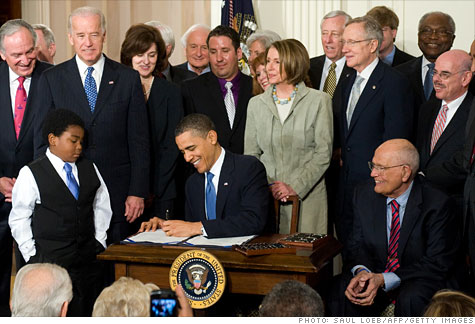Search News
 President Obama signs the Affordable Care Act
President Obama signs the Affordable Care Act
FORTUNE -- The health care system in America has been set up, thanks to decades of government and private sector incentives, to be all about treatment, not prevention. Now, Merck (MRK, Fortune 500) is feeling the effects of that mindset on preventative care with one of its drugs called Proscar, which has been proven to reduce the risk of prostate cancer. Doctors aren't prescribing it, according to a new survey. The Proscar dilemma reflects a larger trend in American healthcare -- one that Americans will have to confront starting in September.
Parts of President Obama's Affordable Care Act are slated to go into effect then. The act mandates free preventative services including cholesterol tests, breast cancer screenings and tetanus shots to people who buy new plans after it passes. But it remains to be seen whether doctors and patients will take advantage of new preventative services.
Reluctance to prescribe a preventative cancer drug has hurt Proscar, according to a Bloomberg report. The drug falls under a category of treatment called chemoprevention. Chemoprevention means prescribing drugs to group of patients at risk for developing a certain disease. Essentially, doctors would have to tell patients at risk, but still healthy, to take a drug as a preventative measure for cancer, something few people want to contemplate, let alone preemptively combat.
Part of the problem with chemoprevention is that you can't really measure its success. Success in Proscar's case means that a cancer-free patient doesn't develop cancer. There's no way to know if a patient would have developed prostate cancer without the drug. The success of the drug can only be studied by comparing rates of tumor growth in a group of patients who took the drug vs. a group that didn't.
Since the best result is a negative -- not developing cancer -- basic human psychology makes it hard for us to appreciate the absence of an outcome as a positive. Throwing in the basic distrust and skepticism many Americans are feeling about every large institution these days -- let alone the combination of government, pharmaceutical companies and health care providers -- does not make the situation read like a prescription for the success of drug-based preventative care.
Yet in studies, Proscar has does well doing just that -- preventing cancer. A 2003 report looked at two groups of men with an average risk of prostate cancer-one group took Proscar for seven years, the other didn't. Men who took Proscar were almost 25% less likely to develop prostate cancer than patients in the other group.
Why we won't take our (preventative) medicine
But for some reason, doctors aren't prescribing Proscar for preventative treatment, according to a study released in the journal Cancer Epidemiology, Biomarkers & Prevention. Most physicians and urologists surveyed said they simply never raised the issue of chemoprevention with patients. In other words, before doctors can convince patients about the benefits of preventative drugs, most will have to be convinced themselves.
Drugs as a form of preventative care face a particularly high hurdle because they can cause side effects. Proscar specifically can cause hair growth, since the main ingredient in Proscar is finasteride, which also the main ingredient in Merck's hair loss pill Propecia, and also impotence. Generally, these side effects are unlikely and mild -- but not irrelevant.
Though side effects sound scary, they're not the ultimate dissuader here. Indeed, it's just as hard to convince Americans to buy into plain old health screenings, which have no side effects at all. Or to get doctors to offer the least expensive yet best form of care, which according to Atul Gawande's now famous article in the New Yorker last year, means talking to patients more cutting back on expensive diagnostic tests.
So convincing doctors and patients to accept chemoprevention will need to be part of a greater shift in American healthcare. It would mean doctors and patients in this country would have to think about health in terms of minimizing risk. Of course, eating right, exercising, quitting smoking and sleeping enough are probably the best ways to minimize risk of a whole host of preventable diseases. If everybody did that, there would be a lot less need for preventative drugs in the first place. ![]()






| Company | Price | Change | % Change |
|---|---|---|---|
| Ford Motor Co | 8.29 | 0.05 | 0.61% |
| Advanced Micro Devic... | 54.59 | 0.70 | 1.30% |
| Cisco Systems Inc | 47.49 | -2.44 | -4.89% |
| General Electric Co | 13.00 | -0.16 | -1.22% |
| Kraft Heinz Co | 27.84 | -2.20 | -7.32% |
| Index | Last | Change | % Change |
|---|---|---|---|
| Dow | 32,627.97 | -234.33 | -0.71% |
| Nasdaq | 13,215.24 | 99.07 | 0.76% |
| S&P 500 | 3,913.10 | -2.36 | -0.06% |
| Treasuries | 1.73 | 0.00 | 0.12% |
|
Bankrupt toy retailer tells bankruptcy court it is looking at possibly reviving the Toys 'R' Us and Babies 'R' Us brands. More |
Land O'Lakes CEO Beth Ford charts her career path, from her first job to becoming the first openly gay CEO at a Fortune 500 company in an interview with CNN's Boss Files. More |
Honda and General Motors are creating a new generation of fully autonomous vehicles. More |
In 1998, Ntsiki Biyela won a scholarship to study wine making. Now she's about to launch her own brand. More |
Whether you hedge inflation or look for a return that outpaces inflation, here's how to prepare. More |